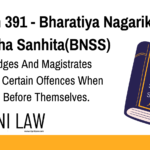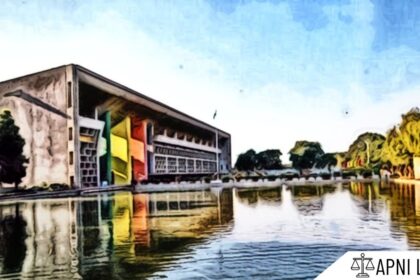Code: Section 392 BNSS
Pronouncement of Judgment
(1) The judgment in every trial in any Criminal Court of original jurisdiction shall
be pronounced in open Court by the presiding officer immediately after the termination of
the trial or at some subsequent time not later than forty-five days of which notice shall be
given to the parties or their advocates,—
(a) by delivering the whole of the judgment; or
(b) by reading out the whole of the judgment; or
(c) by reading out the operative part of the judgment and explaining the substance
of the judgment in a language which is understood by the accused or his advocate.
(2) Where the judgment is delivered under clause (a) of sub-section (1), the presiding
officer shall cause it to be taken down in short-hand, sign the transcript and every page
thereof as soon as it is made ready, and write on it the date of the delivery of the judgment
in open Court.
(3) Where the judgment or the operative part thereof is read out under clause (b) or
clause (c) of sub-section (1), as the case may be, it shall be dated and signed by the
presiding officer in open Court, and if it is not written with his own hand, every page of the
judgment shall be signed by him.
(4) Where the judgment is pronounced in the manner specified in clause (c) of
sub-section (1), the whole judgment or a copy thereof shall be immediately made available
for the perusal of the parties or their advocates free of cost:
Provided that the Court shall, as far as practicable, upload the copy of the judgment
on its portal within a period of seven days from the date of judgment.
(5) If the accused is in custody, he shall be brought up to hear the judgment pronounced
either in person or through audio-video electronic means.
(6) If the accused is not in custody, he shall be required by the Court to attend to hear
the judgment pronounced, except where his personal attendance during the trial has been
dispensed with and the sentence is one of fine only or he is acquitted:
Provided that where there are more accused persons than one, and one or more of
them do not attend the Court on the date on which the judgment is to be pronounced, the
presiding officer may, in order to avoid undue delay in the disposal of the case, pronounce
the judgment notwithstanding their absence.
(7) No judgment delivered by any Criminal Court shall be deemed to be invalid by
reason only of the absence of any party or his advocate on the day or from the place
notified for the delivery thereof, or of any omission to serve, or defect in serving, on the
parties or their advocates, or any of them, the notice of such day and place.
(8) Nothing in this section shall be construed to limit in any way the extent of the
provisions of section 511.
Explanation of Section 392 BNSS
Section 392 of the Bharatiya Nyaya Sanhita (BNSS) lays down the procedure for the pronouncement of judgments in criminal trials. It ensures that judgments are publicly delivered, properly recorded, and accessible to the parties involved.
Key Provisions:
- Timing and Method of Pronouncement
The judgment must be pronounced in open Court by the presiding officer either immediately after the trial or within 45 days, with advance notice given to the parties. The judgment can be:- Delivered in full,
- Read out in full, or
- Read out the operative part and explained in simpler terms for the accused or their advocate.
- Record of Judgment
- If the judgment is delivered in full, the presiding officer must have it transcribed in shorthand, signed, and dated.
- If the judgment is read out, it must be signed by the presiding officer in open Court.
- If the presiding officer does not write it by hand, every page of the judgment must be signed.
- Access to Judgment
After pronouncement, the judgment or a copy must be made available to the parties or their advocates free of cost. If possible, the judgment should be uploaded to the Court’s portal within 7 days. - Presence of the Accused
- If the accused is in custody, they must be brought to the Court or provided access via audio-video means to hear the judgment.
- If the accused is not in custody, they must attend unless their attendance has been dispensed with due to a sentence of only fine or an acquittal. If multiple accused are present and one is absent, the judgment may still be delivered to avoid delays.
- Validity of Judgment
A judgment is not invalid simply because the accused or their advocate was absent or there was a procedural defect in delivering the notice of the judgment.
Illustrations
Example 1: Full Judgment Delivery
A judge delivers the entire judgment in open Court, and it is recorded by shorthand. The judge signs and dates every page of the transcript.
Example 2: Summary Judgment Reading
A judge reads out the operative part of the judgment and explains the outcome to the accused in a language they understand. The judgment is then uploaded on the Court’s portal within a week.
Example 3: Accused in Custody
If the accused is in custody, they are brought to Court or are connected via audio-video means to hear the judgment.
Common Questions and Answers on Section 392 BNSS
1. What if the accused is absent during the pronouncement of the judgment?
The judgment will not be considered invalid solely because of the absence of the accused or their advocate. However, the Court may still proceed with the pronouncement to avoid unnecessary delays.
2. How long after the trial should the judgment be delivered?
The judgment must be pronounced within 45 days of the trial, and the parties must be notified in advance.
3. Can the judgment be read out partially?
Yes, the presiding officer can choose to read out the operative part and explain the substance of the judgment in a language understood by the accused or their advocate.
Conclusion
Section 392 BNSS ensures that the pronouncement of judgment is done in an open and transparent manner, giving proper access to the parties involved, and preserving the rights of the accused while maintaining procedural efficiency. The guidelines established in this section help maintain the integrity and accountability of the judicial process.








